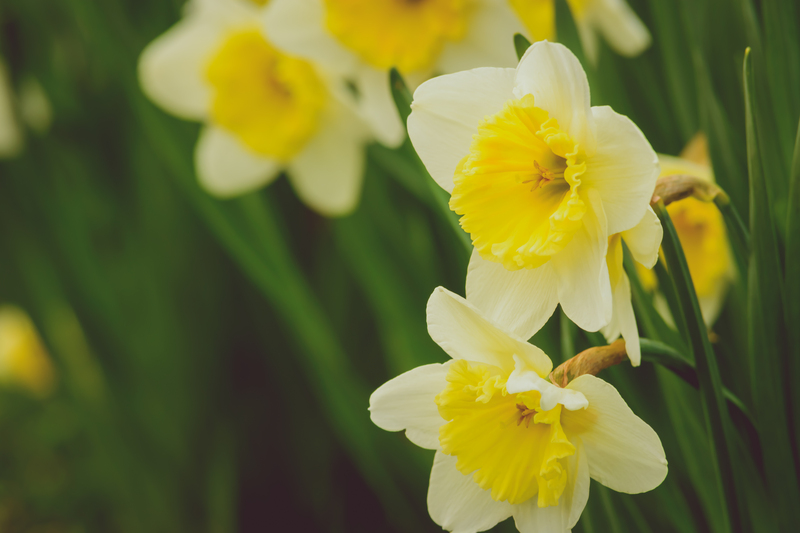Three Foolproof Tips for Successful Weed Management
Posted on 23/09/2025
Three Foolproof Tips for Successful Weed Management
Are you struggling to keep your garden or landscape free of unwanted weeds? Effective weed management is essential for healthy plant growth, an aesthetically pleasing environment, and ensuring your crops or ornamentals thrive. While weeds seem to return no matter what you do, using strategic weed control measures can make a remarkable impact.
In this comprehensive guide, we'll explore three foolproof weed suppression techniques, offer best practices, and reveal why integrated weed management matters. By implementing these time-tested tips, you'll confidently maintain weed-free lawns, gardens, or fields year-round.
Understanding the Basics of Weed Management
Before delving into the top strategies, it's important to grasp what weed management really means. Weed management refers to a combined set of practices designed to reduce the spread and impact of weeds. These plants compete with desirable species for precious resources such as light, water, and nutrients. Without proper control, weeds can overrun your garden or farm, impact yields, or even harbor pests and diseases.
There are several different approaches to weed control, including:
- Mechanical Weed Control: Utilizes manual weeding, mowing, tilling, or hoeing to remove weeds.
- Chemical Weed Control: Uses herbicides to kill or suppress unwanted weed growth.
- Cultural Practices: Involves crop rotation, mulching, and other preventive strategies.
- Biological Control: Leverages natural predators or competitive plants to manage weeds.
A successful weed management strategy typically blends several of these techniques--a concept known as Integrated Weed Management (IWM).

Why Is Weed Control Important?
Successful weed control is vital for various reasons:
- Boosts Crop and Plant Health: Weeds compete with your plants for nutrients, sunlight, and space.
- Prevents Pest and Disease Outbreaks: Many weeds act as alternate hosts for pests and plant diseases.
- Improves Aesthetics: Uncontrolled weeds make gardens and landscapes look neglected.
- Saves Time and Resources: Early and effective management minimizes the need for future interventions.
With the basics understood, let's jump into the three foolproof weed management tips to help you maintain a pristine growing environment.
Tip 1: Implement Preventive Weed Management Practices
Stay One Step Ahead with Prevention
One of the most effective ways to get rid of weeds is stopping them before they start. Preventive strategies are the first line of defense in any robust weed management program. The main idea is to create conditions that are unfavorable for weed germination and establishment.
Practical Weed Prevention Steps
- Mulching: Spread a thick layer of organic mulch (such as straw, bark chips, or leaves) around your plants. This blocks sunlight, stifles weed seedlings, and helps retain soil moisture. For even greater weed suppression, consider weed barriers or landscape fabric beneath mulch layers.
- Proper Spacing and Dense Planting: Arrange your plants closer together to shade the soil, depriving weeds of space and light. Dense planting is particularly effective in vegetable gardens and ornamental beds.
- Regular Garden Maintenance: Routinely inspect and clean your gardening tools and footwear. This reduces the risk of inadvertently spreading weed seeds from one area to another.
- Use Certified Weed-Free Compost and Seeds: Always choose soil amendments and seeds that are certified to be free from weed contaminants.
Why Prevention Works: Practicing these methods not only eliminates future weed problems, but they also encourage healthier, more resilient plants that outcompete weed growth naturally.
Tip 2: Practice Timely and Targeted Weed Removal
Swift Action Ensures Better Results
Even with preventive measures in place, some weeds are bound to appear. The key is to act quickly, removing them before they mature and spread seeds. Consistent, strategic weed pulling and cutting are crucial for lasting weed suppression.
Best Methods for Effective Weed Removal
- Hand-Pulling: This is an effective method, especially for small gardens. Pull weeds when the soil is moist to remove the entire root system--making regeneration less likely.
- Hoeing and Cultivation: Use a sharp hoe to slice weeds off just below the soil surface. Incorporate this method into your regular maintenance to disrupt weed seedlings before they can establish.
- Mowing or String Trimming: For lawns and larger beds, mowing can stop annual weeds from producing seeds. However, repeated mowing is needed to weaken persistent perennial weeds.
- Spot Treating with Herbicides: In some cases, especially with stubborn perennial weeds, targeted application of selective herbicides may be necessary. Always follow label instructions and use herbicides judiciously to avoid harming desirable plants.
Timing Is Everything: The earlier you remove weeds, the better. Target seedlings and young plants, as these are easiest to control and have not yet developed an extensive root system. Never let weeds flower or go to seed--a single weed can produce thousands of seeds, creating trouble for years to come!
Tip 3: Adopt Diverse and Integrated Weed Management Strategies
Combine Tactics for a Weed-Free Landscape
Relying on just one weed management method seldom brings sustainable results. Integrated weed management (IWM) involves rotating and blending different tactics to keep weed populations consistently low. This diversity of approaches prevents weeds from adapting and reduces reliance on any single tactic, such as herbicides.
Essential Integrated Weed Management Approaches
- Rotate Crops & Plant Varieties: Alternating crops each season disrupts weed cycles and reduces the buildup of weed species adapted to specific planting patterns. Use cover crops such as clover or rye to suppress weed growth during off-seasons.
- Cultural Controls: Incorporate competitive groundcover, living mulches, or aggressive ornamental species that naturally shade out weeds.
- Biological Controls: Use natural enemies, such as certain insects or grazing animals, to target specific weed species. Examples include goats for brush control or introducing beetles to combat invasive weeds like purple loosestrife.
- Mechanical & Manual Controls: Utilize regular mowing, tilling, or flame weeding as needed. Each method targets weeds at different growth stages, preventing establishment and seed spread.
- Judicious Herbicide Use: Reserve chemical methods for severe infestations or hard-to-control species, and always combine them with non-chemical approaches.
Why an Integrated Approach Wins: By mixing methods, you reduce the risk of herbicide resistance, preserve beneficial soil organisms, and maintain a healthier growing environment. Integrated weed management is both sustainable and highly effective for long-term control.
Bonus Section: Common Mistakes to Avoid in Weed Control
As you implement these weed management tips, avoid these frequent pitfalls:
- Ignoring the problem early on: Letting weeds mature leads to more seeds and increased infestations.
- Over-reliance on herbicides: Sole use of chemicals can lead to resistance and ignores the benefits of cultural and mechanical methods.
- Poor mulching techniques: Thin mulch layers or using contaminated mulch can actually spread weeds.
- Improper lawn care: Mowing too short stresses turfgrass and gives weeds an opening.
Learn from these mistakes to ensure your weed control strategies are as effective as possible.

Frequently Asked Questions About Weed Management
- What is the most effective way to get rid of weeds permanently?
No single solution eliminates weeds permanently. Combining prevention, timely removal, and integrated weed management provides ongoing control and minimizes regrowth. - Can I manage weeds without chemicals?
Absolutely! Mechanical removal, mulching, dense planting, and crop rotation are all non-chemical methods for effective weed suppression. - When is the best time to tackle weeds?
Address weeds early in the growing season before they seed. Frequent monitoring and prompt removal are key. - Are there plants that naturally outcompete weeds?
Yes. Groundcovers such as creeping thyme, vinca, or sedum can effectively suppress weed growth by forming dense mats.
Sustainable Weed Control for the Future
Effective weed management is a blend of art and science. By focusing on prevention, timely removal, and integrated strategies, you can keep your living spaces thriving and productive--without resorting to excessive chemical interventions.
Remember: Consistent action and a diverse approach are the cornerstones of successful weed suppression. Regularly review your gardening or farming practices, stay vigilant for new weed threats, and adjust your methods as needed.
To recap, here are the three foolproof tips for successful weed management:
- Implement Preventive Practices - Block weeds before they begin with mulching, dense planting, and good hygiene.
- Remove Weeds Quickly and Efficiently - Consistently pull, hoe, or mow weeds at the earliest signs.
- Diversify with Integrated Management - Blend mechanical, cultural, biological, and chemical controls for lasting results.
Step into the growing season prepared: Commit to these tips and enjoy a lush, healthy, and weed-free space today! For more gardening advice, weed control tips, or organic landscape solutions, explore our other guided resources and remain a step ahead in weed management.
Latest Posts
Three Foolproof Tips for Successful Weed Management
Tools Every Green Thumb Must Possess
Eco-Friendly Urban Living with Vertical Gardens

